What Do Catholics REALLY Believe About Mary, Saints and Statues?
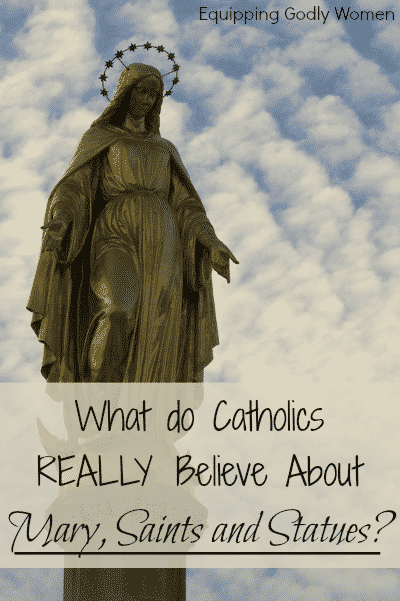
This post is post 8 in a series entitled Letting God Lead: My Journey Through Protestant and Catholic Beliefs. While you certainly can read this post by itself, I highly encourage you to check out the rest of the series as well. Find more about this series and a list of all of posts here. *This post contains affiliate links.
For many Protestants, some of the most difficult Catholic Church teachings to accept are the Church’s beliefs surrounding Mary and the Saints. I’m guessing this is due to the following reasons:
1. There’s a lot of misunderstanding about what the Catholic Church actually teaches
2. What individual Catholics do in practice doesn’t always match official Roman Catholic Church teaching.
3. It’s just *weird* to Protestants who grew up in a completely different culture
Now, I can’t speak as to what every individual Catholic does in practice. I’m new on the scene and only personally know a handful of Catholics. So, understand that that is not my intent. Instead, we’re going to talk primarily about official Catholic Church teaching so we can separate some of the fact from the fiction. What you do with it as an individual–well, that’s up to you.
Do Catholics Worship Mary?
First of all, Catholics do NOT worship Mary. They think very highly of her and honor her (the word they use is “venerate” — which means hold in high regard or treat with great respect, more than you would to a king, but less than you would to God), but they do NOT worship Mary or think she is equal with God at all.
I can see why Protestants think Catholics do. They pray to her, they put up pictures of her, they say the Hail Mary, (some Catholics in some parts of the world DO mistakenly worship her)… BUT the official answer is: No, they do not.
Here’s my 2 cents on the issue: Worship is an attitude. It’s intentionally honoring someone as God. You can’t accidentally worship someone. For example, I like to worship by singing rockin’ praise and worship songs. That’s worship to me. If my 5 yo hears me, gets the song stuck in his head and then is singing it later, is he worshipping God too? Not really. Yes, he is honoring God, but he’s not really worshipping. He’s just singing a catchy song.
And really, if ANYTHING is worshipping someone, what about all the country love songs out there? There are tons of songs that go on and on and on about how wonderful and perfect and amazing a woman is. Are they worshipping? No. Because that’s not their intent. The singers think the woman is awesome, but they certainly don’t think she’s equal to God.
So, if a Catholic is praying to Mary or kissing the feet of a statue of her, are they worshipping? Not automatically. It really depends what is going on in their hearts and what they are intending to do. Are they trying to bring honor and respect to the person God himself honored more than anyone or anything else in all of creation? Or do they see Mary herself as their savior and God? There’s a HUGE difference there.
And as Catholics say: “You can never love Mary more than Jesus did.”
Hope that clears things up a bit.
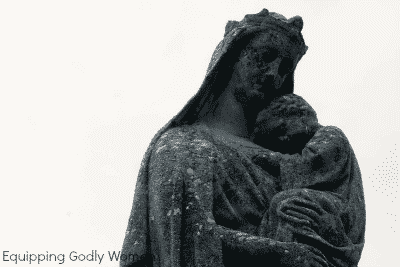
What Does the Catholic Church Teach About Mary?
Catholics believe Mary:
- was preserved from Original Sin (by God, not her own merits) and remained sinless throughout her entire life
- remained a virgin throughout her entire life
- is the new Eve
- is the mother of the Church
- is in Heaven already
- acts as an advocate or intercessor for Christians today
1. Mary was Without Original Sin
Catholics believe that Mary was conceived without original sin, not because she earned it or deserved it, but because God chose to preserve her from it in order that she would be a pure vessel for the Holy Baby she would later carry.
Q: But what about Romans 3:23 and 1 John 1:8, which say that all have sinned? Well, if ALL had sinned, that would include Jesus, since he was a man too. So “all” can’t mean “every single one without any exception.”
Q: But if Mary was sinless, why would she need a savior (Luke 1:47)? I love the analogy Bryan gave in the comments section of the 10 Common Catholic Myths Critics Believe post. I believe it originally came from Franciscan theologian Duns Scotus. Bryan wrote:
You’re walking along a road and fall into a deep hole. Someone comes along and drops down a ladder or rope and gets you out. They’ve saved you, correct? But your clothes are probably dirty and maybe have a few holes.
What if that same person where to shout at you BEFORE falling into the hole? Aren’t they still a savior? And look, your clothes are still clean!
That’s the Catholic view of Mary’s Immaculate Conception. In anticipation of the redemptive work of Christ, Mary was preserved by God in a special way from any stain of Original Sin. He kept her from ever falling into the hole.
Makes sense to me.
Now, I don’t believe you’ll find the belief that Mary was a virgin explicitly spelled out in the Bible. Like I said in the Who Has the Ultimate Authority? A Biblical Look at Sola Scriptura post, the Bible doesn’t cover every single question that could ever possibly come up throughout the entire rest of the world.
So, when the Bible doesn’t mention things, Catholics go back to what the first century Christians believed and passed down, and from what I understand Mary’s sinlessness was never seriously questioned for centuries. It was common knowledge and widely accepted. So when the Catholic Church officially declared it doctrine in 1854, they weren’t making up a new belief, they were simply formally defining something they had always believed.
2. Mary was a Perpetual Virgin
Protestants believe Mary was a virgin up through the time she gave birth to Jesus. Catholics believe she remained a virgin forever.
Q: But what about Matthew 13:55, which lists Jesus’ brothers? Apparently, the word we have for “brothers” in English could better be translated as “cousins.” Other verses list these same brothers as sons of another Mary.
Also, when Jesus dies, he entrusts his mother to the disciple John. If he had brothers and sisters, wouldn’t he entrust her to one of them?
Q: Then why does Matthew 1:25 say Mary was a virgin “UNTIL” Jesus’s birth? This is another example of a text that loses some of its meaning in translation. In the original language, “until” speaks of the time only *until* the event–it doesn’t reference anything that occurs *after* at all.
Another example would be 1 Corinthians 15:25, which says God will reign “until” He puts His enemies under His feet. Surely God won’t stop reigning once His enemies are under his feet.
Q: Then why is Jesus called the Firstborn? In the Bible, the term “firstborn” doesn’t mean “the child who was born first.” Instead it was the ceremonial title for the child who receives the birthright (think Jacob and Esau).
Q: Where is Mary’s Perpetual virginity mentioned in the Bible? Like her sinlessness, it’s not (to my knowledge). But, as I said before, the Church holds to all of the teachings of the apostles equally–both those that were written down (in the Bible) and those that were passed on orally (Sacred Tradition).
3. Mary is the New Eve
All Christians believe that Jesus is the new Adam (Romans 5:12-18); Catholics complete the analogy by viewing Mary as the new Eve. I have to admit, there are a ton of interesting parallels. This article has 6 Biblical Reasons Mary is the New Eve if you want to read more.
4. Mary is the Mother of the Church
Not that she created the church, but that she is a sort of mother figure. Kind of like Father Abraham to the Jews? I’m sketchy on the details, so if any Catholics want to leave more details in the comments section…. *hint hint* 🙂
5. Mary is in Heaven Already
Just a note–the Church is silent on whether or not Mary died first before she was taken up to Heaven, so Catholics are free to believe whichever way they want.
6. Mary Acts as an Intercessor
I’m going to lump Mary as an intercessor in with Saints as intercessors, so hang in there–we’ll get there! lol
***I also want to talk about the Rosary and the Hail Mary and all that, but I’m going to save that discussion for the post on “Weird Catholic Stuff,” scheduled for March 25th.
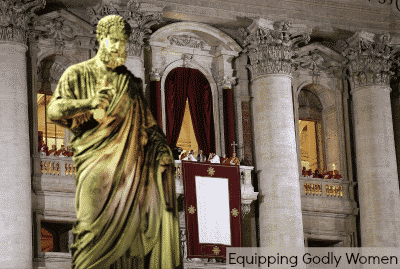
Why Do Catholics Pray to Saints?
When Protestants need prayer for something, they have two options: They can pray to God themselves, or they can ask others to pray for them. Catholics have a third option: In addition to praying to God directly or asking a friend or family member to pray for them, they can ask a Saint to pray for them as well.
Catholics base their prayers to the Saints on the following verses:
“And when he had taken it, the four living creatures and the twenty-four elders fell down before the Lamb. Each one had a harp and they were holding golden bowls full of incense, which are the prayers of God’s people.” –Revelation 5:8
“Therefore confess your sins to each other and pray for each other so that you may be healed. The prayer of a righteous person is powerful and effective.” –James 5:16 (And who is more righteous than those who are already in Heaven?)
Now, I want to point out–Catholics don’t believe that you HAVE to pray to Saints, or that it is better to pray to them than to God, and they don’t only pray to Saints. They just view it as an option that we have.
Also–another incredibly important point–Catholics (theoretically) don’t believe that the Saints actually have the power to DO anything. They are just asking the Saints to intercede for them–exactly like how Protestants ask their friends to pray for them. They believe that God is still the one who ultimately answers the prayers.
Catholics don’t pray TO the Saints, they pray THROUGH the Saints, or ask the Saints to pray on their behalf.
Although, honestly, as far as I can tell, this is one of those instances where what Catholics teach and what Catholics practice don’t entirely line up. For example, consider these two papers my son brought home from school.

I actually took these to a Catholic priest to ask, “How can Mary help us say yes to God and how can Saint Therese help us love God if they aren’t supposed to be able to actually DO anything?” His response was basically “Well, we believe they ask God to help us, not that they do it themselves.” So… then why doesn’t it say that? Because that’s not what these papers say at all.
And consider this article about Saint Anthony, Patron Saint of Lost Items. The lengthy prayer to Saint Anthony says: “O gentle and loving St. Anthony, whose heart was ever full of human sympathy, whisper my petition into the ears of the sweet Infant Jesus, who loved to be folded in your arms; and the gratitude of my heart will ever be yours.”
Several phrases come to mind like: “St Anthony please let my sweatpants be found soon! I believe in you!” “This Saint Anthony has never let me down when I call for his intercession with regard to lost or misplaced items.” and “Amanda credits Saint Anthony with their return from the sea!!”
Again, it’s important to keep in mind the distinction between what the Catholic Church actually officially teaches and what people do. Not to say that they are a bunch of people who say one thing and do another… (at least, not any more than any other Christian–we’re all guilty of this on occasion). Just to say–just because some people get things wrong doesn’t automatically mean that the official teachings themselves are wrong.
Q: Okay, so what about how the Bible says there is only one mediator–Jesus (1 Tim 2:5)? The Catholic Church does believe that Jesus is our one, true mediator. He’s the only one who can truly get the job done or make it even possible that we would have a relationship with God at all.
But Catholics also recognize that God’s people are called to take part in this mediation as well. In fact, the Bible commands it, using words like “intercession” or “intercede,” which mean the same thing.
“First of all, then, I urge that supplications, prayers, intercessions, and thanksgivings be made for all people” –1 Timothy 2:1
“And pray in the Spirit on all occasions with all kinds of prayers and requests.With this in mind, be alert and always keep on praying for all the Lord’s people.” –Ephesians 6:18
“for I know that through your prayers and God’s provision of the Spirit of Jesus Christ what has happened to me will turn out for my deliverance” –Phillipians 1:19
Protestants believe that Christians can and should pray for each other while they are here on this Earth. Catholics simply believe that the prayers don’t stop once the Saints die and go to Heaven. That the same Saints that prayed for people while on Earth continue to do so even now that they are in Heaven.
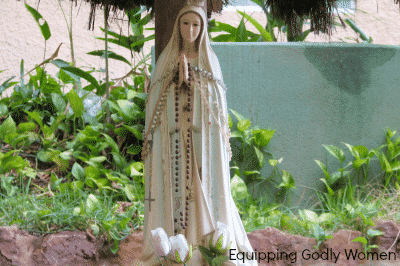
Why Do Catholics Have Statues?
While this issue generally isn’t nearly as big as the whole Mary/Saint debate, it is still quite a sticking point for many: Why do Catholics have statues? Isn’t that idol worship?
First of all, no, Catholics don’t worship statues any more than random city residents worship the statues in their towns. The Catechism of the Roman Catholic Church expressly forbids idolatry, and defines idolatry as following:
“The first commandment condemns polytheism. It requires man neither to believe in, nor to venerate, other divinities than the one true God. Scripture constantly recalls this rejection of ‘idols, [of] silver and gold, the work of men’s hands…” (2112)
“Idolatry not only refers to false pagan worship…Idolatry consists in divinizing what is not God. Man commits idolatry whenever he honors or reveres a creature in place of God…” (2113)
This is not how Catholics treat their statues. Here’s what you should find instead:
1. Statues are Used for Remembrance
Similar to how people put pictures of their friends and family members around their homes or on their fridge, statues allow Catholics to remember the Saints who have gone before and to be inspired to live up to the high standards they set for us.
2. They are Used for Teaching
Also–another thing that you need to remember is in the early days of the Church, people didn’t have copies of the Bible and–even if they had–they couldn’t read. Statues, pictures, icons the stations of the cross–all of these things were used as teaching tools, just like how Protestants have pictures of Jesus, nativity scenes, crosses with crowns of thorns, and felt boards with little felt Bible characters.
3. God Specifically Requested Statues in Worship
In Exodus 25, when God was laying out the instructions for the ark of the covenant, He called for it to have statues of Cherubim.
“And make two cherubim out of hammered gold at the ends of the cover. Make one cherub on one end and the second cherub on the other; make the cherubim of one piece with the cover, at the two ends. The cherubim are to have their wings spread upward, overshadowing the cover with them. The cherubim are to face each other, looking toward the cover.” — Exodus 25:18-20
If God specifically requested the ark of the covenant to be decorated with statues then, I highly doubt He is deeply offended by them now.
4. Old Testament History
And the ark isn’t the only time God called for statues either. In Numbers 21:8-9, God tells Moses to make a bronze snake, which the people look at to be healed. In Ezekiel’s vision in Ezekiel 41:18-20, he sees carved cherubim and palm trees.
Q: Why Do Catholics Remove the Second Commandment? If you look closely at the Protestant 10 Commandments and the Catholic 10 Commandments, you’ll notice something odd–they aren’t exactly the same. Commandment #2 about not worshipping idols is missing from the Catholic version.
BUT this isn’t because Catholics are trying to get rid of it. Instead, the New Testament account of the 10 Commandments doesn’t actually number them as ten. Instead, it lists 14 imperative statements, and–don’t forget–the original copies don’t include verse numbers. Therefore, commandments were grouped together, and Catholics (and Jews) simply group them differently than Protestants. All of the info is still there–just arranged a little differently.
Okay, so I hope that clears things up a little bit! What questions do you still have? What points did I miss? See you in the comments section below!!
Loving this series so far? Don’t forget to sign up for the Equipping Godly Women Newsletter for up-to-date info and behind the scenes sneak peaks!
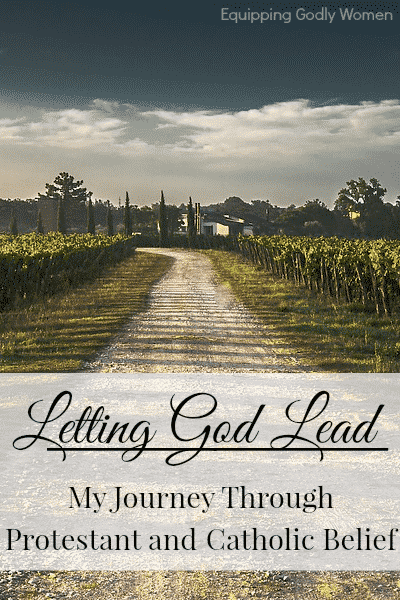
Enjoyed this post? Don’t miss the rest of the posts in the series!
The Day I Realized My Religion Got it Wrong
10 Common Catholic Church Myths that Critics Believe
Is the Eucharist Really Just a Symbol?
Who has the Ultimate Authority? A Biblical Look at Sola Scriptura
A Brief Look at the History of Christianity
What All Christians Should Know About Priests, the Pope and Confession
What Do Catholics Really Believe About Mary, Saints and Statues?
Infant Baptism or Believer’s Baptism? Which is Correct?
What is Purgatory? What are Indulgences?
Why Do Catholics….? Honest Answers to Your Burning Questions
Protestant and Catholic Beliefs Series Conclusion
Resources and Further Reading
I’m not asking you to believe because I say so. Please DON’T take my word for it! The purpose of this series is only to share what I’ve learned on my journey in order to inspire you to begin a journey of your own. Here are a few helpful resources to get you started.
*This post contains affiliate links, which means if you make a purchase, I may make a small commission at no additional cost to you. Thank you!
Catechism of the Catholic Church
Surprised by Truth: 11 Converts Give Biblical and Historical Reasons for Becoming Catholic by Patrick Madrid
The Catholic Church: What Everyone Needs to Know by John L. Allen
https://www.catholic.com/tract/do-catholics-worship-statues
https://www.catholic.com/tract/praying-to-the-saints
http://www.catholicscomehome.org/two-minute-answers/
http://www.gotquestions.org/intercessory-prayer.html
http://www.gotquestions.org/prayer-saints-Mary.html

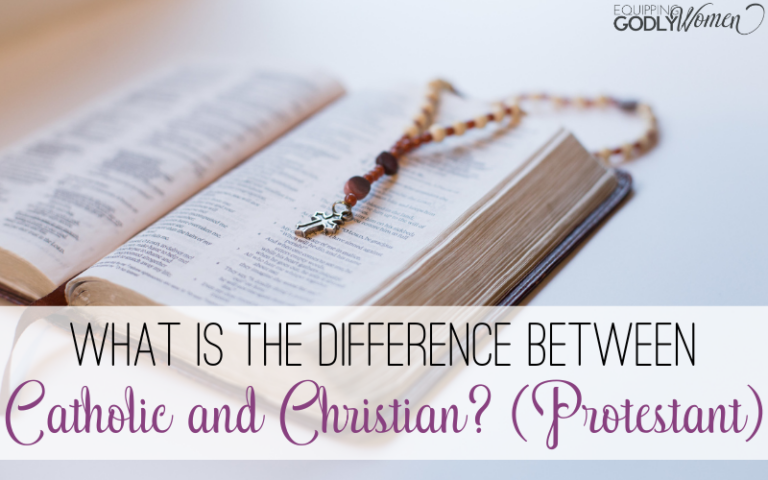





I grew up Catholic. The autobiography of St. Therese taught me the intimacy of prayer:) St. Teresa of Ávila has an wonderful book – “Interior Castles.” I didn’t realize until much later that most of the Catholic Mass was scritpure (like the Hail Mary – first part is Luke 1:28 – the second a request for intercession). I thiink one of the most eye-opening experiences about Mass is when we went to a Bat Mitzvah a long time ago – and I saw where the Catholic Mass came from – from the format for Jewish worship. The only difference was Catholics had new testament readings. I so love that you’re trying to answer questions. So many people think Catholicism is a cult – when historically it traces its “ancestry” to Christ.
Yes, I think attending a Jewish service would really shed a lot of light on things too. I imagine there are real reasons why things are the way they are–we just don’t know always know them!
You will find Dr. Brian Pitre talks on the Mass and its Jewish connections REALLY, REALLY enlightening and also Dr. Scott Hahn’s talk on ‘The 4th cup’ helpful.
This resource will provide you with some really great info on the Jewish connections. These sites are all extremely good.
http://www.hebrewcatholic.net/jewish-roots-of-the-church/
from Marty Barrack (cute conversion, available on The Coming Home Network)
http://www.secondexodus.com/
and last, but not least, from a former atheist (former Jew) Harvard professor with a powerful conversion story; Roy Schoeman.
http://salvationisfromthejews.com/
In his Prescott (Arizona) mission, Roy shares his conversion story, along with insights into the Jewish culture and the intimate relationship of Mary with the Holy Spirit, in addition to a lot of other info. For non-Catholics, and even for Catholics who are not deep into Catholic theology, a couple of the things he says sound really strange, but he is SOLID. It is a language ‘thing’, like the two posters your child brought home from school, it’s a language ‘thing’ (trust me when I say ‘it will grow on you’).
Anyway, here are the three links (in sequence to his 3-day mission). Great info.
Day 1 = https://www.youtube.com/watch?v=WeDzSfquYcs
Day 2 = https://www.youtube.com/watch?v=or-gmyT27I4
Day 3 = https://www.youtube.com/watch?v=l9kEXDG3sEg
Not only can we ask those who are in Heaven already to pray for us, we can also pray for those whose lives were not perfect and are in Purgatory. They need our prayers to shorten their time in Purgatory.
Yep! I’ve heard of that too.
Another great article, Brittany!
I want to emphasize the idea of “typology” when reading Scripture. In the case of Mary, you’re correct that she is the New Eve. But she is also much more than that.
It starts with Mary prophecied as the New Eve in Genesis 3:15 – “And I will put enmity between you and the woman, and between your seed and her Seed; He shall crush your head, and you shall strike at His heel.”
This was very unusual language. Women in the time of Scripture were not referred to as having “seed.” Children were the “seed” of their father. So we have a prophecy of the virgin birth and Mary’s role in it, making her the Second Eve.
Just as there were similarities between the First Adam and the First Eve, we can expect similarities between the Second Adam and Second Eve.
Adam and Eve began their lives in an Immaculate state, as did Christ, so we should expect the Second Eve to also begin her life immaculate just as the First Eve and Second Adam. This also explains other teachings about Mary.
Because Christ was dedicated to serving the Lord, it would make since for Mary as the New Eve to be dedicated to the Lord as well. (Perpetual Virginity)
And just as Adam and Eve shared the same fate by returning to dust, we would expect the New Eve to share the same fate as the New Adam who went to Heaven. (Assumption)
So the New Eve is the beginning, but we also view Mary as Queen of Heaven. Why?
Heaven is the Kingdom, with Christ as King. In the Old Testament, the Queen wasn’t the King’s wife. It was his mother. So Mary, as Mother of God, is Queen in His Kingdom.
The final parallel to understand is Mary as the new Ark of the Covenant.
The Old Testament Ark: contained manna, Aaron’s rod (symbol of priesthood), and original ten commandments (word of God/Law)
Mary: carried Christ in her womb who is revealed as the Bread of Life (manna), high priest, Word made flesh, and fulfillment of the Law
The Old Testament: The Ark stayed 3 months at the house of Obed-edom, who was greatly blessed by the Lord because of the Ark.
Mary: stayed three months with Elizabeth
The Old Testament: David danced before the Ark as it was brought into Jerusalem
Mary: John the Baptist leapt for joy in his mother’s womb upon hearing Mary’s voice
The Old Testament: The Ark went with the people of Israel everywhere they went until the conquering of Jerusalem and building of the first Temple.
Mary: Went everywhere with Jesus until He was laid in the tomb, then followed Him after the resurrection until His ascension.
These are just some of the things we can find in Scripture that demonstrate the importance of Mary’s role.
C.S. Lewis said, “The Roman Catholic beliefs on that subject (the Blessed Virgin Mary) are held not only with the ordinary fervor that attaches to all sincere religious belief, but (very naturally) with the peculiar and, as it were, chivalrous sensibility that a man feels when the honor of his mother or his beloved is at stake. It is very difficult so to dissent from them that you will not appear to them as a cad as well as a heretic.” It is not belief that separates Catholics and Protestants on this issue as much as passion! Catholics LOVE Mary. She is not a side note in the story, but the reason the story exists at all. What your little son’s workbook paper was trying to illustrate (very poorly, I agree) was Mary’s YES. When God sends Gabriel to announce the coming of Christ, Gabriel’s words make it seem like a “done deal”. But then Mary says, “I am the handmaid of the Lord. May it be done unto me according to your word.” (Luke 1:38). Why would she be compelled to say that if it was not her choice? Would God have forced a young unmarried woman into an unplanned pregnancy? Did Mary not have free will, as we believe all humans have? Could Mary have said NO? I posed this question to my third grade religious education class. They agreed that Mary could have done things her own way. They had fun speculating on what would have happened if she had decided the name Emmanuel or Jesus was no good and she had named the baby Bob instead. But, broaden the question. What if she had chosen the route of abortion (extremely dangerous, but available throughout the centuries)? What if she had just left the baby in that manger, trusting the inn keepers to raise him? What if she had decided Egypt sounded too dangerous and given him over to Herod? What if she had not bothered to take him to the temple every year and teach him to read the scriptures? Mary is our mother because she does what mothers do. She puts her child first. And, in Mary’s case, that means she puts God first. In every decision she makes, she cooperates fully with God’s plan for salvation and she does it out of love.
Furthermore, consider not just that she loved Christ as her child AND as the Lord, but also that Christ loved her. I think most Christians can agree that Jesus was sinless. As such, He would have followed the commandments perfectly, including “Honor your father and your mother.” (Ex 20:12). Indeed this is evidenced at the wedding feast in Cana (John 2: 1-11). Jesus states that his “hour has not yet come” implying that he had no intention of intervening, but he does as his mother asks out of respect for her. In turn, we are called to act as Christ acted (1 John 2:6, 1 Peter 2:21, 1 Cor 11:1, etc.). Logically that extends to loving and respecting Mary as our mother. I believe Christ reinforces this when he says, “Woman, behold your son. Son, behold your mother.” (John 19:26-27). John refers to himself as “the disciple whom Jesus loved” to remind us that Jesus isn’t just talking TO John throughout the gospel, but THROUGH John to all his beloved disciples. Jesus expects us to “take her (Mary) into our homes.”
Mary isn’t the “Mother of the Church” in the sense that she is it’s founder or innovator or head-honcho, but in the sense that she is our Mama. The way you might start to call your best friend’s mother Mama Jones because she makes sure your favorite snacks are on hand, and laughs at your antics, and loves the way way you love her child. Loves you for the friendship you provide. Mary loves us for loving Christ and we love her for loving Christ. In this way, she is our mother. Hope this helped you grasp the idea. I’m sure it’s hard to love a woman you didn’t grow up with!
“I’m sure it’s hard to love a woman you didn’t grow up with!” — yep. That pretty much sums it up 🙂
Scott Hahn is a great resource on understanding the biblical roots of catholic teaching. He was a Presbyterian (I think) pastor and he and his wife eventually converted to the last thing they thought they’d ever be- Catholics!- after his study of the early church.
Also, to enhance your learning, I highly recommend the Lighthouse Media CDs. Dr. Scott Hahn has a talk on “The Virgin Mary Revealed Through Scripture” and “Discovering the Biblical significance of Mary”
Another high quality resource with video. . .because, really. Kids. Haha I love listening and watching you tube videos while cleaning or cooking.
Anyway, in general, if you want top notch research and answers from a biblical perspective, Scott Hahn is an excellent resource.
Thanks. I’m familiar with the name and love what I’ve read so far! (and yes, I love listening to YouTube and podcasts while cleaning and cooking too 🙂 )
As a life-long Catholic, I am surprised when non-Catholics say that they do not really know Mary. I think that Mary provides us with a fully human example of how we can love God. Because Mary is human, she also knows what we go through in our daily lives. As a mother, I feel that I can turn to Mary, our mother. I can only imagine the pain that Mary felt in watching her son persecuted and crucified.
I also feel close to the saints. As Christians, we all strive to be saints, as a part of the Communion of Saints; we acknowledge that the list of named saints is likely not complete, but we try to recognize those who have shown true love for God, and we also try to follow their examples.
I like what Kimberly Hahn said in Rome Sweet Home–something along the lines of–she couldn’t possibly relate to Mary. She was perfect and her son was perfect. The struggles she faced were probably not anything like the ones we do! (food for thought)
I found this great quote by Archbishop Fulton Sheen about Mary being without sin. 🙂
“As no weeds grew in Eden so no sin would arise in Mary, the paradise of the Incarnation. A barn door cannot fittingly serve as an entrance to a castle.”
Good quote. Still just a quote, not the Bible, though 🙂
Of course. 🙂
It just seems like a good explanation as to why Mary would be without sin.
Because nowhere in the Bible does it specifically say that she was or wasn’t.
None of it could be possible without God anyway, if she was without sin, it’s because that’s how God wanted it.
Exactly. I have no idea if she was or wasn’t, but personally, I don’t think it makes that much of a difference either way 🙂
I’ve heard you say several times that this belief doesn’t make much of a difference either way. However, the bottom line is that I cannot ever receive communion in a Catholic church unless I believe it. The church whose name means “universal,” who lays claim to the apostles and all of the early church fathers as exclusively belonging to their tradition, who claim to believe so strongly in the “communion of the saints,” refuses communion to anyone who does not believe every point of their dogma about Mary. Catholics and Protestants all agree in believing the Bible to be the inspired written word of God; that God is the author, although he used various humans to put the words on paper. If God chooses to write a book, isn’t He capable of making sure that the essential information necessary for salvation and participation in the church is included in its pages? Every denomination, and even local fellowship, may have different traditions and practices, some going back hundreds of years, but I think it is a problem when these extra-Biblical things become mandatory for full fellowship and communion.
Oh yes, I totally get where you’re coming from there! That’s where I’m stuck too. I went through RCIA until the point where I had to get up in front of God and man and say that the Catholic Church is 100% correct on everything. I couldn’t do it. I still can’t.
Romans 3:23 is very clear “All have sinned and fallen short of the glory of God.” These are God’s words and God does not lie.
Some will say this possibly couldn’t mean “all” because Jesus was human. Jesus is God. What they forget is Jesus is God. Jesus’/God’s glory is what we all have never been able to obtain. Any blanket statements in the Bible about the human race does not apply to Jesus for He is God.
And others will say that Jesus needed to be preserved from sin so the “immaculate conception” was conceived (pun intended). 🙂 There is NOTHING in the bible about the immaculate conception. Nothing!!! This was not needed because Jesus, being God, was immune to sin. He didn’t need to be protected. This concept usurps God’s power and might.
God bless.
Yes, Jesus is fully God, but He is also fully human. You can’t just forget his humanity because he is God too. (I have no idea how that works; I just know he’s fully both).
And Jesus wasn’t “immune” to sin – he was perfectly capable of sinning just like the rest of us. That’s why Hebrews 4:15 says “For we do not have a high priest who is unable to empathize with our weaknesses, but we have one who has been tempted in every way, just as we are–yet he did not sin.” If he were not ABLE to sin, then it wouldn’t have been a temptation. He was able to sin – he just didn’t.
Strengthen your faith in God and you will realise you don’t need mediators. Everything else is just an excuse to cover one’s lack of faith in God! God’s grace is sufficient in every way.
But… if that’s the case… why are you reading this blog? Or any blog or Christian living book? Why go to church? We’re ALL just mediators that help bring people closer to God. Why not go straight to God Himself? (Just something to think about)
Thanks for your reply Brittany.
You hit the nail on the head, that’s exactly what I do. I go straight to God. No mediator needed. Yesterday you made me realise that our forefathers Moses, Abraham, David etc all went straight to God with their needs, they gave thanks and worshipped him as the one true living God. It strengthened my believe that God was sufficient for them and is sufficient for us.
The reason why I came across your blog is because I had been searching for differences in Catholics/Protestants/Anglicans. I found your blog quite helpful and detailed to my purpose. Thank you for this.
Regards
Diana
I’m glad you found it helpful! But my point was — we all go to people sometimes. And there’s nothing wrong with that. I’m sure you read Christian books, Christian blogs, ask your friends to pray for you, ask your friends for advice. There’s nothing wrong with any of that 🙂 It doesn’t mean we don’t go to God, but we DO and CAN go to people too for additional help.
And that’s exactly what Catholics believe too. That you absolutely can and should go straight to God. But that you can ask other people for additional help as well.
<3
4. Mary is the Mother of the Church
Not that she created the church, but that she is a sort of mother figure. Kind of like Father Abraham to the Jews? I’m sketchy on the details, so if any Catholics want to leave more details in the comments section…. *hint hint*
Jesus is the church and the church is Jesus, all Christian believe so. Mary being the mother of Jesus makes her the mother of the church
Jesus is NOT the church. Jesus is the Head of the church. Jesus and TRUE believers make up the church. Mary is another believer. Unfortunately over the centuries, the RCC has continued to elevate her to a position that is not worthy of anyone except the Trinity. There is a movement within the RCC to elevate her to co-redeemer. Once that happens, the RCC will go from a Christian church with doctrine problems to a non-Christian Christian, new religion.
Catholics believe Mary:
was preserved from Original Sin (by God, not her own merits) and remained sinless throughout her entire life
remained a virgin throughout her entire life
is the new Eve
is the mother of the Church
is in Heaven already
acts as an advocate or intercessor for Christians today
BTW – these are all beliefs of the Roman Catholic Church that have NO Biblical basis. There is not one scripture that supports any of these “traditions” of the RCC.
“If you abide in me, and my words abide in you, ask whatever you wish, and it will be done for you.” –John 15:7
“Well, I don’t know about you and I’m certainly not calling the Bible a liar, but that hasn’t been my experience at all! I’ve had plenty of prayers go unanswered, both big and small, and I bet you have too.”
Ans: Well it hasn’t been ur experience at all cause uve refused to abide in him and in his words
Uve always abide in Him since day one u think; but in his words? No! Remember we are all sinners and if we continue to sin, we’re breaking His rules and also getting Him upset… we ain’t abiding in Him neither are we abiding to his words
We all need His sufficient graces in our lives, with this; we are 100% fine